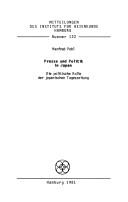| Listing 1 - 10 of 24 | << page >> |
Sort by
|

ISBN: 0813827108 Year: 1997 Publisher: Ames Iowa State University Press
Abstract | Keywords | Export | Availability | Bookmark
 Loading...
Loading...Choose an application
- Reference Manager
- EndNote
- RefWorks (Direct export to RefWorks)
Mass communications --- Japan --- J4126 --- J0960 --- Japan: Sociology and anthropology -- media and (mass) communications --- Japan: Journalism -- general and history --- Mass media
Book
ISBN: 9781138189591 9781138647039 9781315626222 9781317234340 1138189596 1138647039 Year: 2017 Publisher: London Routledge
Abstract | Keywords | Export | Availability | Bookmark
 Loading...
Loading...Choose an application
- Reference Manager
- EndNote
- RefWorks (Direct export to RefWorks)

ISBN: 0824817613 0824816986 9780824817619 9780824816988 0585345058 0824863550 Year: 1996 Publisher: Honolulu: University of Hawai'i Press,
Abstract | Keywords | Export | Availability | Bookmark
 Loading...
Loading...Choose an application
- Reference Manager
- EndNote
- RefWorks (Direct export to RefWorks)
J4126 --- J0961 --- J4600.90 --- Mass media --- -Mass communication --- Media, Mass --- Media, The --- Communication --- Japan: Sociology and anthropology -- media and (mass) communications --- Japan: Journalism -- policy, legislation, guidelines, codes of behavior --- Japan: Politics and law -- history -- postwar Shōwa (1945- ), Heisei period (1989- ), contemporary --- Political aspects --- -Japan --- Politics and government --- -J4126 --- -Mass media --- Japan --- Nihon --- Nippon --- Iapōnia --- Zhāpān --- I︠A︡ponii︠a︡ --- Yapan --- Japon --- Japão --- Japam --- Mư̄ang Yīpun --- Prathēt Yīpun --- Yīpun --- Jih-pen --- Riben --- Government of Japan --- Mass communication --- Mass media - Political aspects - Japan --- Japan - Politics and government - 1945 --- Médias --- Aspect politique --- Politique et gouvernement --- 1945-....

ISBN: 0691059543 1283611031 1400845874 9786613923486 9781283611039 9781400845873 9780691059549 Year: 2000 Publisher: Princeton, N.J. Princeton University Press
Abstract | Keywords | Export | Availability | Bookmark
 Loading...
Loading...Choose an application
- Reference Manager
- EndNote
- RefWorks (Direct export to RefWorks)
How is the relationship between the Japanese state and Japanese society mediated by the press? Does the pervasive system of press clubs, and the regulations underlying them, alter or even censor the way news is reported in Japan? Who benefits from the press club system? And who loses? Here Laurie Anne Freeman examines the subtle, highly interconnected relationship between journalists and news sources in Japan. Beginning with a historical overview of the relationship between the press, politics, and the public, she describes how Japanese press clubs act as "information cartels," limiting competition among news organizations and rigidly structuring relations through strict rules and sanctions. She also shows how the web of interrelations extends into, and is reinforced by, media industry associations and business groups (keiretsu). Political news and information are conveyed to the public in Japan, but because of institutional constraints, they are conveyed in a highly delimited fashion that narrows the range of societal inquiry into the political process. Closing the Shop shows us how the press system in Japan serves as neither a watchdog nor a lapdog. Nor does the state directly control the press in ways Westerners might think of as censorship. The level of interconnectedness, through both official and unofficial channels, helps set the agenda and terms of political debate in Japan's mass media to an extent that is unimaginable to many in the United States and other advanced industrial democracies. This fascinating look at Japan's information cartels provides a critical but often overlooked explanation for the overall power and autonomy enjoyed by the Japanese state.
Mass media --- Press and politics --- Censorship --- Political aspects --- J0960 --- J0961 --- J4126 --- Politics and the press --- Press --- Advertising, Political --- Government and the press --- Journalism --- Mass communication --- Media, Mass --- Media, The --- Communication --- Japan: Journalism -- general and history --- Japan: Journalism -- policy, legislation, guidelines, codes of behavior --- Japan: Sociology and anthropology -- media and (mass) communications

ISBN: 0415279186 0415279194 Year: 2006 Publisher: London Routledge. Taylor & Francis Group
Abstract | Keywords | Export | Availability | Bookmark
 Loading...
Loading...Choose an application
- Reference Manager
- EndNote
- RefWorks (Direct export to RefWorks)
Sociology of culture --- Mass communications --- Computer architecture. Operating systems --- Japan --- Internet --- Popular culture --- J4126 --- J4143 --- J4486 --- DARPA Internet --- Internet (Computer network) --- Wide area networks (Computer networks) --- World Wide Web --- Social aspects --- Japan: Sociology and anthropology -- media and (mass) communications --- Japan: Sociology and anthropology -- cultural trends and movements -- popular culture --- Japan: Economy and industry -- communication -- internet
Book
ISBN: 1000369145 9781000369144 9781003095392 1003095399 9781000369151 1000369153 9780367558284 0367558289 9780367558437 0367558432 Year: 2021 Publisher: London Routledge, Taylor & Francis Group
Abstract | Keywords | Export | Availability | Bookmark
 Loading...
Loading...Choose an application
- Reference Manager
- EndNote
- RefWorks (Direct export to RefWorks)
Japan's nationalist right have used the internet to organize offline activism in increasingly visible ways. Hall investigates the role of internet-mediated activism in Japan's ongoing historical and territorial disputes. He explores the emergence of two right-wing activist organizations, Nihon Bunka Channel Sakura and Ganbare Nippon, which have played a significant role in pressure campaigns against Japanese media outlets, campaigns to influence historical memorials, and campaigns to assert Japan's territorial claim to the Senkaku/Diaoyu Islands. Taking a multi-disciplinary approach, he analyses how activists maintained cohesion, raised funds, held protests that regularly drew hundreds to thousands of participants, and used fishing boats to land activists on disputed islands. Detailing events that took place between 2004 and 2020, he demonstrates how skilled social actors built cohesive grassroots protest organizations through the creation of shared meaning for their organization and its supporters. A valuable read both for scholars seeking insight into the dynamics surrounding Japan's history disputes and territorial issues, as well as those seeking to compare Japanese right-wing internet activism with its counterparts elsewhere.
J4015 --- J4126 --- J4000.90 --- Japan: Social sciences in general -- right wing socio-political and socio-economic movements --- Japan: Sociology and anthropology -- media and (mass) communications --- Japan: Social history, history of civilization -- postwar Shōwa (1945- ), Heisei period (1989- ), contemporary --- E-books --- Right-wing extremists --- Far-right extremists --- Radicals --- National movements --- Mass communications --- Japan
Book
ISBN: 9780824862015 0824862015 Year: 1997 Publisher: Honolulu
Abstract | Keywords | Export | Availability | Bookmark
 Loading...
Loading...Choose an application
- Reference Manager
- EndNote
- RefWorks (Direct export to RefWorks)
Creating a Public is the first comprehensive history of Japan's early newspaper press to appear in English in more than half a century. Drawing on decades of research in newspaper articles and editorials, journalists' memoirs and essays, it tells the story of Japan's newspaper press from its elitist beginnings just before the fall of the Tokugawa regime through its years as a shaper of a new political system in the 1880s to its emergence as a nationalistic, often sensational, medium early in the twentieth century.
Press --- Press and politics --- Journalism --- Public interest --- J0960.70 --- J4126 --- State, The --- Common good --- Writing (Authorship) --- Literature --- Publicity --- Fake news --- Politics and the press --- Advertising, Political --- Government and the press --- Media, News --- Media, The --- News media --- Newspapers --- Periodicals --- History --- Social aspects --- Japan: Journalism -- history -- Kindai (1850s- ), bakumatsu, Meiji, Taishō --- Japan: Sociology and anthropology -- media and (mass) communications --- Political aspects --- Japan

ISBN: 392146983X Year: 1981 Volume: 122 Publisher: Hamburg : Institut für Asienkunde Hamburg,
Abstract | Keywords | Export | Availability | Bookmark
 Loading...
Loading...Choose an application
- Reference Manager
- EndNote
- RefWorks (Direct export to RefWorks)
Press and politics --- Tanaka, Kakuei, --- Japan --- Japon --- Politics and government --- Politique et gouvernement --- J0961 --- J0960 --- J4126 --- -Japan --- -Politics and the press --- Press --- Advertising, Political --- Government and the press --- Journalism --- Japan: Journalism -- policy, legislation, guidelines, codes of behavior --- Japan: Journalism -- general and history --- Japan: Sociology and anthropology -- media and (mass) communications --- -Political aspects --- Political aspects --- Tanaka, Kakuei --- -Japan: Journalism -- policy, legislation, guidelines, codes of behavior --- -Tanaka, Kakuei --- Politics and the press

ISBN: 0231102313 9780231102315 9780231102308 Year: 1996 Publisher: New York Columbia University Press
Abstract | Keywords | Export | Availability | Bookmark
 Loading...
Loading...Choose an application
- Reference Manager
- EndNote
- RefWorks (Direct export to RefWorks)
791.43 <5> --- Filmkunst. Films. Cinema--Azië --- Motion pictures in propaganda --- Motion pictures --- National characteristics, Japanese. --- Political aspects --- Social aspects --- 791.43 <5> Filmkunst. Films. Cinema--Azië --- National characteristics, Japanese --- Japanese national characteristics --- Cinema --- Feature films --- Films --- Movies --- Moving-pictures --- Audio-visual materials --- Mass media --- Performing arts --- Moving-pictures in propaganda --- Propaganda in motion pictures --- Propaganda --- History and criticism --- J6839 --- J4122 --- J4126 --- Japan: Media arts and entertainment -- cinema --- Japan: Sociology and anthropology -- nationalism --- Japan: Sociology and anthropology -- media and (mass) communications
Book
ISBN: 0415465974 9780415465977 1138992550 9786612084324 1134037287 1282084321 0203880293 9780203880296 9781134037285 9781282084322 6612084324 9781134037230 9781134037278 9781138992559 Year: 2009 Publisher: London New York Routledge
Abstract | Keywords | Export | Availability | Bookmark
 Loading...
Loading...Choose an application
- Reference Manager
- EndNote
- RefWorks (Direct export to RefWorks)
The Japanese economy is the second largest in the world and is becoming once more one of the most competitive. Despite the stagnation and deflation experienced during the 1990s, Japan has progressively become more aware of the need to be a global player, in particular under the radical administration of former Prime Minister Koizumi. A vigorous approach to intellectual property borrowed from the US and Europe, stressing the importance of innovation, assisted in kick-starting the Japanese economy again and has sustained its increasingly high performance. This book examines how Japan has used
J0901 --- J4126 --- J4757 --- J4301 --- J4300.90 --- Intellectual property --- -Intellectual property --- IP (Intellectual property) --- Proprietary rights --- Rights, Proprietary --- Intangible property --- Japan: Information science and management -- policy, legislation, guidelines, codes of behavior --- Japan: Sociology and anthropology -- media and (mass) communications --- Japan: Law and jurisprudence -- commercial law -- copyright and intellectual property --- Japan: Economy and industry -- policy, legislation, guidelines, codes of behavior --- Japan: Economy and industry -- history -- postwar Shōwa (1945- ), Heisei period (1989- ), contemporary --- Economic aspects --- -Law and legislation --- Japan --- Economic policy --- Law and legislation
| Listing 1 - 10 of 24 | << page >> |
Sort by
|

 Search
Search Feedback
Feedback About UniCat
About UniCat  Help
Help News
News